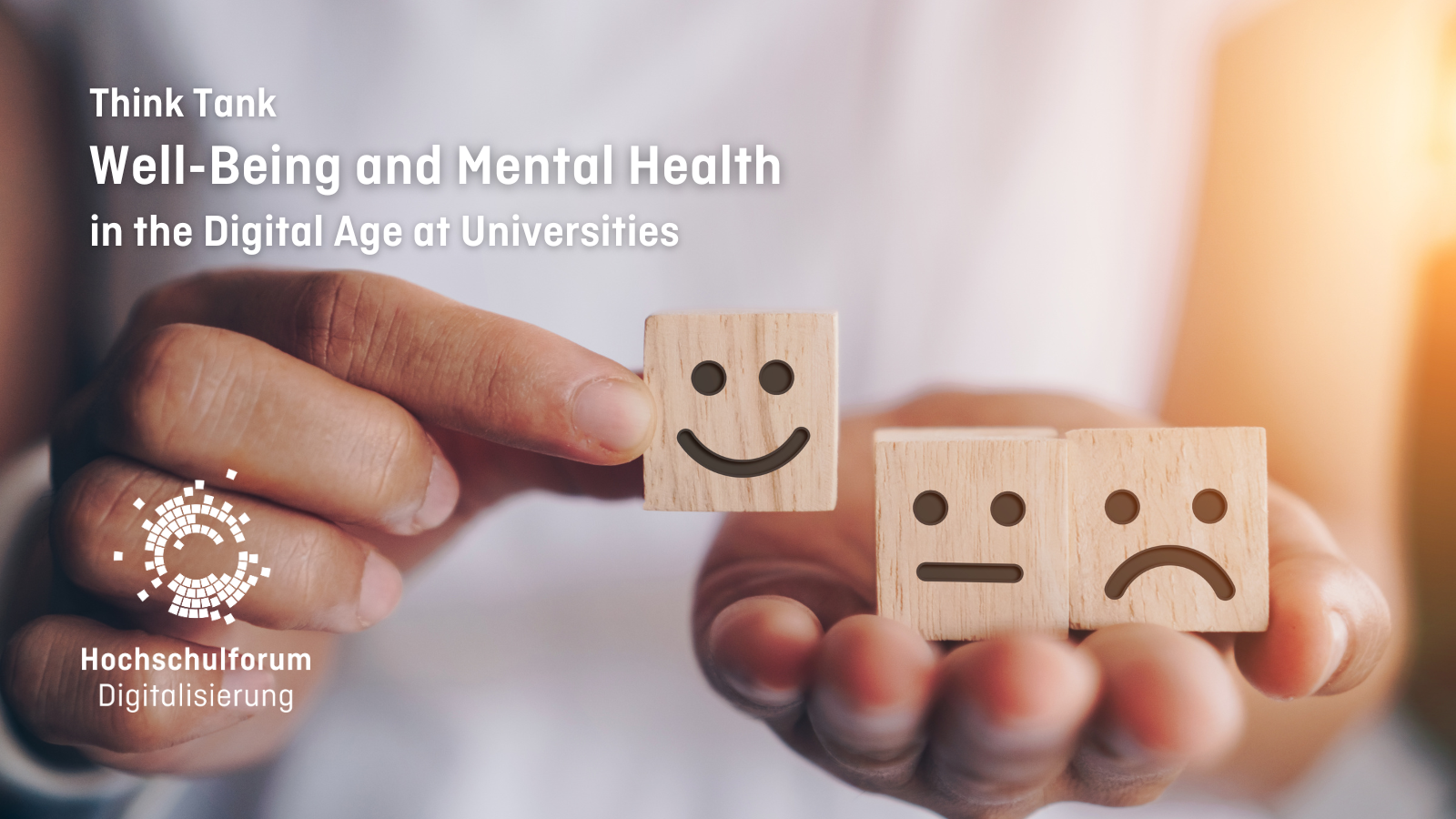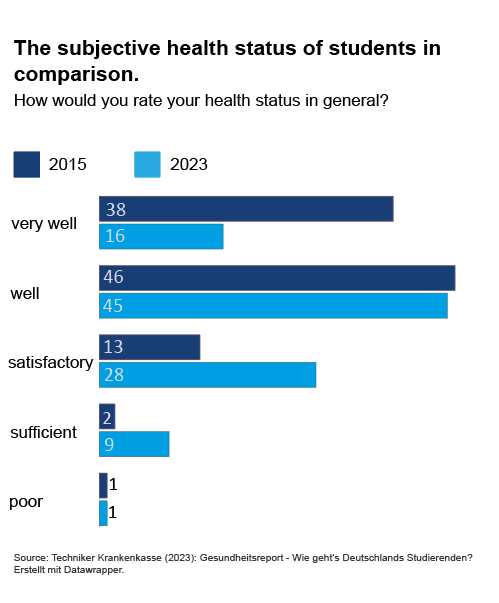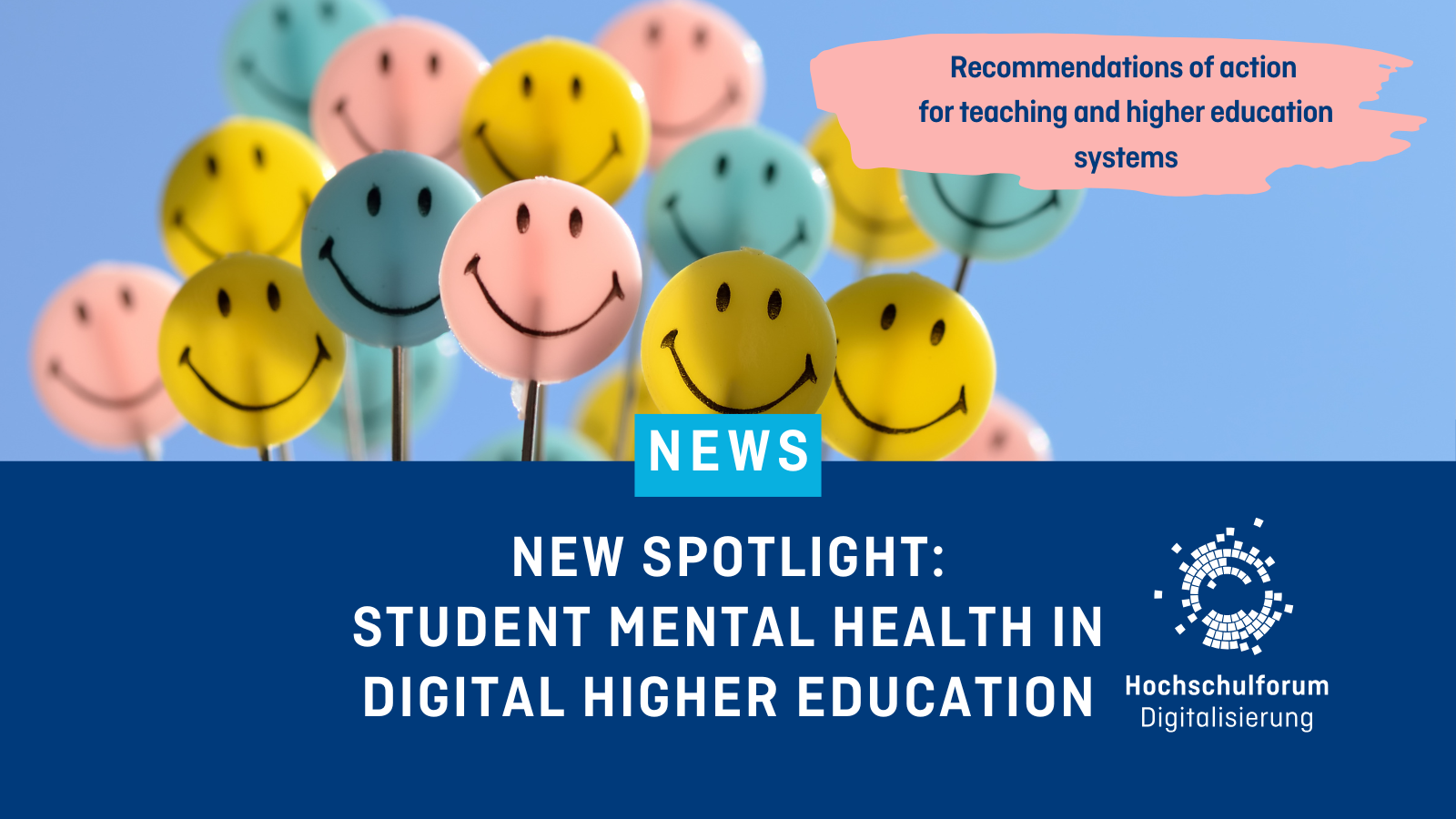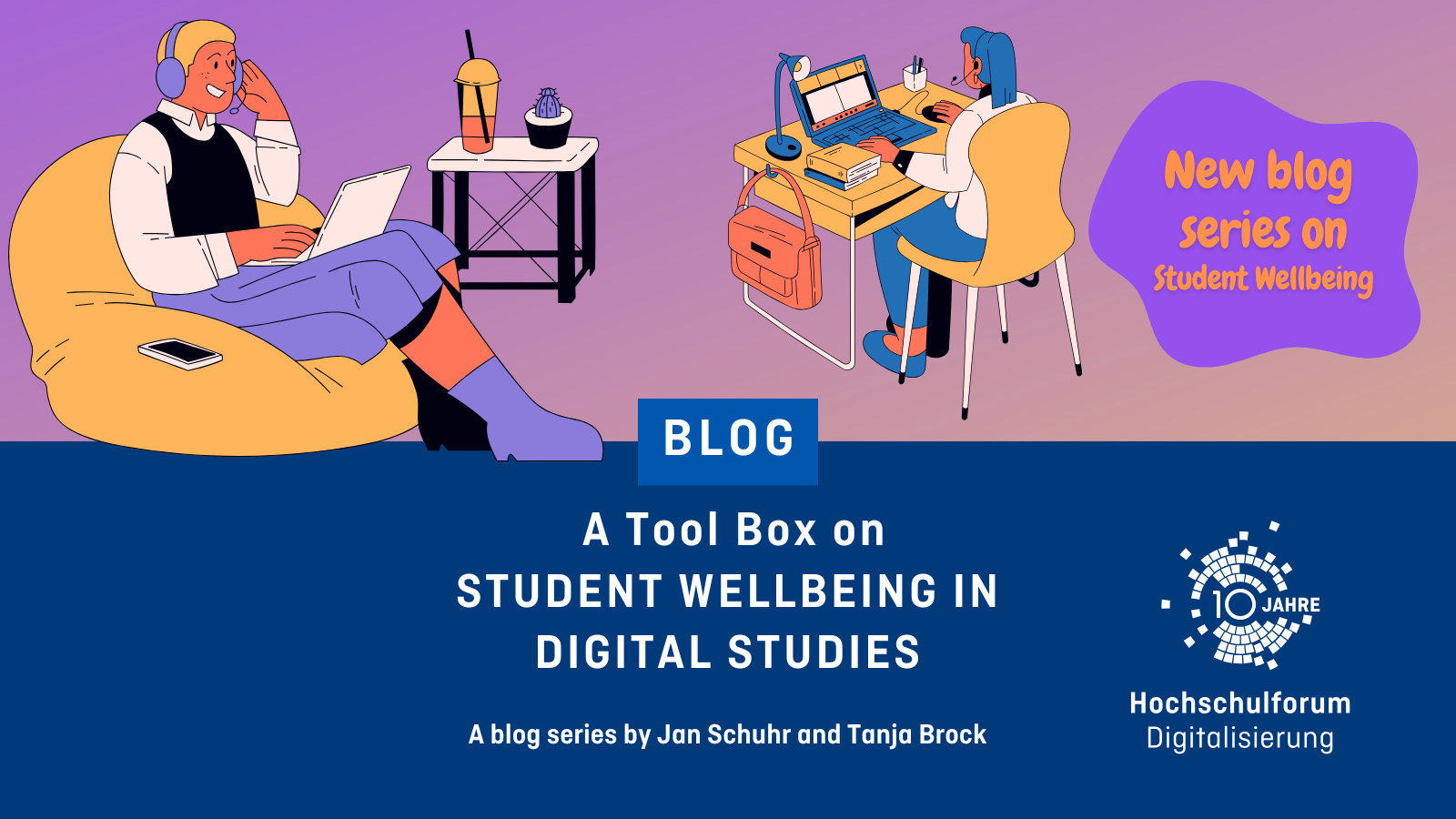ThinkTank Well-Being and Mental Health in the Digital Age at Universities
Universities play a key role in shaping the society of tomorrow. The digital transformation is fundamentally changing the way we teach and learn. It offers great potential for innovation and flexibility, but also poses challenges in terms of the health of students and university staff. This has been reinforced not least by the shift of (all) teaching operations to the digital space during the coronavirus pandemic. Universities must pursue a balanced digitalization strategy that both exploits the opportunities of digitalization and minimizes potential risks. Against this background, the think tank “Well-Being and Mental Health in the Digital Age” at Hochschulforum Digitalisierung is committed to raising awareness of the topic of mental health in the digital university context.

At international level, some universities are already addressing the topic of “Well-Being” and integrating initiatives, indicators and participatory measures into their own university strategies. The University of British Colombia (UBC) has developed a “Wellbeing Strategic Framework“, which takes a collaborative and cross-university approach to making theto make the university a better place to work, study and learn. UBC and other universities follow the “Okanagan Charter“, an international charter for health-promoting universitieswhich was developed and adopted in 2015 by strategic decision-makers, teachers and students from 45 countries.
The Charter defines health as a comprehensive concept that means far more than the mere absence of illness. The The physical, mental and social well-being – or “Well-Being” – of all university members is seen as the prerequisite for a functioning teaching and learning concept. seen. It is therefore important that health-promoting values and guidelines – from the holistic concept of wellbeing to social justice and sustainable development – are incorporated into the guidelines and the strategic orientation of universities be included.
A comparison of the subjective state of health of students in 2015 and 2023 clearly shows that students rate their own health as increasingly poor. At first glance, the general state of health of students (2023) appears positive at 61% (“very good” to “good”). The number of students who state that they feel “less good” to “bad” has more than tripled between 2015 (3%) and 2023 (10%). tripled.
These developments underline the urgent need to discuss and address Well-Being as a central element in higher education. This is the only way to establish sustainable and resilient educational structures that meet the individual and collective requirements of an increasingly digitalized world.
In order to change health management at German universities at a strategic level, a holistic, cross-university approach should be pursued. A key component of this strategic change is a cultural shift that overcomes stigmas – particularly in the area of mental health – and firmly anchors the concept of Well-Being in the university culture. The strategic integration of a comprehensive Well-Being concept can not only promote the future viability of universities, it can also pave the way for sustainable and future-oriented education.

Goals of the think tank:
-
Sensitize strategic decision-makers to the wellbeing needs of students and employees at universities and to the importance of wellbeing for strategic university development.
-
Raising awareness and informing teachers and support staff by providing examples of good practice and practical information
-
Making the perspectives and needs of students and employees visible
Through these objectives, the think tank “Well-Being in the Digital Age” strives to establish the topic of Well-Being at universities as a central theme and make it visible.
News:
New Spotlight: Student Mental Health in Digital Higher Education
The new HFD Spotlight deals with the overarching question of how the mental health of students can be promoted more strongly within digital higher education. After all, digital teaching is proving to be particularly challenging in terms of students’ mental health. In cooperation with the Dresden research project enhance and the student initiative DigitalChangeMakers, Tina Basner has clearly presented the background and solution approaches in this new publication. It offers interested parties an easy introduction to the topic and shows what is important when implementing solutions.

New Spotlight: Student Mental Health in Digital Higher Education
New Blog Series on Student Well-Being
How are the mental health of students and digitalization processes at universities connected? What about the support structures for students at universities? And how can online teaching or digitally supported teaching be designed to promote health? Tanja Brock and Jan Schuhr from the University of Applied Sciences for Social Work, Education and Nursing addressed these and similar questions in the research and practice development project enhance (Mental Health in the Context of Digitalization Processes at Universities), a joint project with the University of Leipzig Medical Center, which is funded by the Saxon State Ministry of Science, Culture and Tourism. As part of the project, they spoke to students, lecturers and university health stakeholders about their personal experiences, needs, ideas and perspectives regarding health-promoting universities. They have summarized important findings in the form of a toolbox in four blog posts. The tools and checklists contained therein can be used for your own everyday university practice.

A toolbox on “Student wellbeing in digital studies”
Panel discussion on “Student Wellbeing & Mental Health” at the University: Future Festival 2024
To kick off the think tank “Wellbeing & mental health in the digital age at universities”, the HFD invited six experts to a panel discussion on the Community Stage of the University:Future Festival in Berlin. On 5 June 2024, lecturers, researchers, committed students from the HFD’s Digital Change Maker Initiative and other experts from strategic (health) management discussed the topic of “Student Well-Being & Mental Health” with a focus on digitalization processes at universities. The aim of the panel discussion was to raise awareness of current challenges to mental wellbeing in the course of the digital transformation at universities and to jointly develop solutions and visions for the future (“Mindscapes of Tomorrow”). Together, they explored the question of how well-being and mental health can be collectively addressed and, above all, de-tabooed at universities . In the discussion, ideas were discussed and impulses provided on how universities can support the mental well-being and safety of their students in digital learning spaces in a rapidly changing world. The recording of the discussion can be viewed on YouTube:
A big thank you to the invited experts:
- Tanja Brock (Research associate in the ENHANCE project – mental health in the context of digitalization processes at universities, Dresden Protestant University of Applied Sciences)
- Prof. Andreas Dengel (Lecturer in Computer Science Didactics, Forbes 30Under30 award winner, advocate for mental health in academia & affected person, University of Frankfurt)
- Lea Hildermeier (student at Bielefeld University, DigitalChangeMaker 2023, founding member and board member of LiliGoesMental.de)
- Paula Paschke (lecturer, equal opportunities officer and expert on digital violence at universities, DigitalChangeMaker 2022, University of Frankfurt)
- Anna Pawellek (Coordinator of the nationwide competence center “Health-promoting universities”, Hanover)
- Tina Basner (Moderation & Head of Think Tank “Wellbeing & Mental Health in the Digital Age at Universities at HFD)
Contact & contact person:
Do you have ideas or good practice on how we can make universities a healthier place in the digital age? The HFD offers you a platform and the opportunity to become visible, e.g. through blog posts, workshops or presentations at our events, and to jointly develop solutions and recommendations for action.
Please do not hesitate to contact us:
 Tina Basner
Tina Basner

